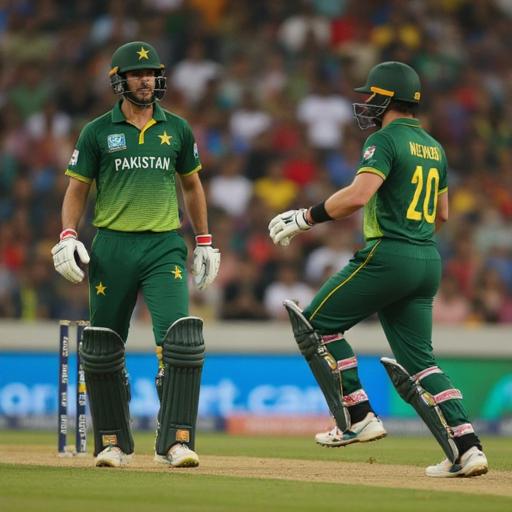Pakistan Cricket Team’s Meeting with Maulana Tariq Jameel: A Deep Dive

Pakistan Cricket Team’s Meeting with Maulana Tariq Jameel: A Deep Dive
The recent meeting between the Pakistan cricket team and renowned Islamic scholar Maulana Tariq Jameel has sparked considerable interest and discussion. This article delves into the potential motivations behind this meeting, its implications for the team’s performance, and the broader societal context surrounding religious influence in sports.
This wasn’t just a casual get-together; it seems to have been a significant event. Understanding the details will be crucial for understanding its broader meaning.
Did the meeting impact the team’s performance? Was it a mere gesture of respect or something more profound? Read on to find out.
The Context: Sport and Spirituality in Pakistan
Pakistan, a nation deeply rooted in its religious beliefs, often sees a significant intersection between sports and spirituality. Religious figures frequently address national teams, offering guidance and support. This interaction isn’t unique to cricket; it’s a recurring theme across various sports, reflecting the importance of faith in the country’s cultural fabric.
Maulana Tariq Jameel, with his widespread influence and reputation as a spiritual leader, holds a special position within this landscape. His sermons and talks often resonate with a broad spectrum of people, including athletes. This cultural and religious backdrop provides critical context for understanding the motivation behind such interactions.
Possible Motivations Behind the Meeting
Several factors likely contributed to the Pakistan cricket team’s meeting with Maulana Tariq Jameel. It’s reasonable to suggest that the meeting aimed to:
- Promote spiritual well-being: The meeting might have been an attempt to foster a sense of unity and spiritual support among team members, especially during periods of intense pressure or competition. Maulana Jameel’s teachings often emphasize mental and spiritual well-being, and these values can be highly beneficial for sports performance.
- Enhance team cohesion: Sports teams, especially high-pressure environments like international cricket, need strong bonds. The meeting could have been an opportunity for team building, instilling shared values, and fostering a sense of community amidst the rigorous training and travel schedule.
- Seeking blessings: In many cultures, especially in Pakistan, individuals often seek blessings and guidance from religious figures for significant endeavours, particularly in competitive environments like sports. This meeting could have been a way to invoke divine blessings for the team’s success in upcoming matches.
- Maintaining positive morale: The cricket team, like any high-stakes sporting entity, can experience ups and downs. This interaction might have acted as a source of encouragement and motivation, bolstering morale and reducing stress.
Implications for Team Performance
The meeting’s impact on the team’s performance is a complex question, and it’s crucial to avoid making simplistic conclusions. While no direct causal link can be definitively established, the meeting could potentially influence the team’s mindset in several ways:
Increased focus on mental well-being and discipline are possible positive outcomes. The emphasis on spirituality may contribute to a more focused and disciplined approach to training and match preparation. However, external factors like the players’ individual commitment to their religious practices, and the specific guidance provided are key determinants. Additionally, the overall atmosphere within the team is undoubtedly important.
The overall impact needs further analysis. We must look at various factors before drawing any specific conclusions.
Societal Perceptions and Criticism
While some view such interactions as a positive demonstration of faith and its integration into everyday life, others might criticize them as an overbearing influence of religious elements on sports.
Concerns about potential interference in team dynamics, and a possible bias towards religious individuals within the selection process are valid points that need to be acknowledged and addressed.
It is important to recognise different perspectives on this issue. The issue is complex and not easily resolved, especially since it touches upon both sport, religion and personal opinions. Maintaining neutrality and acknowledging diverse viewpoints are crucial.
Looking Forward
The meeting between the Pakistan cricket team and Maulana Tariq Jameel provides an excellent opportunity to explore the intertwining of spirituality, faith and sports in Pakistan. This kind of interaction is a complex phenomenon that warrants careful and balanced consideration.
The meeting’s long-term effects need further observation and analysis, but the importance of cultural and religious factors within a sporting context cannot be understated. A deeper understanding can help us appreciate the multifaceted nature of these interactions, allowing us to examine them in a nuanced and comprehensive way.
Conclusion: A Multifaceted Issue
The meeting between the Pakistan cricket team and Maulana Tariq Jameel is a multifaceted issue that touches on several critical aspects of Pakistani culture, sports, and faith. It’s important to avoid generalizations and appreciate the wide range of motivations and perspectives involved.
Further investigation and analysis are needed to fully comprehend the impact of such interactions on team dynamics, performance, and the broader societal landscape.
This article aims to provide a balanced perspective, avoiding overly simplistic conclusions and acknowledging the many complexities inherent in the situation.
What do YOU think about the meeting? Share your thoughts in the comments below!